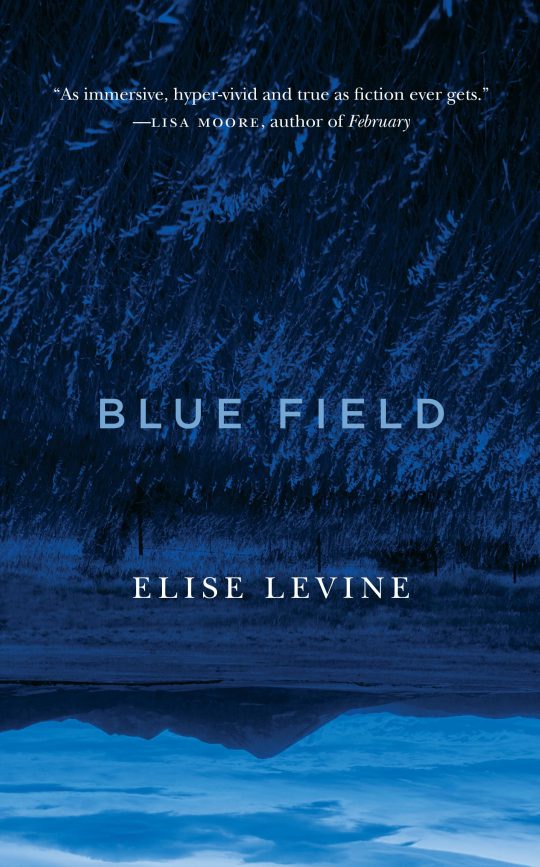
Author Photo by Britt Olsen-Ecker
Levine’s spare language works brilliantly to capture both the vastness of the open water and the claustrophobic chaos of underwater caverns. — Benjamin Woodard
Blue Field
Elise Levine
Biblioasis, 2017
224 pages; $14.95
.
Much like her thrill seeking protagonist, author Elise Levine’s isn’t interested in convention, and in her new novel, Blue Field, she cleverly toys with structure and omission to tell the story of Marilyn, a woman who takes up cave diving as an outlet to escape the sadness she feels for her recently deceased parents. Levine’s spare language works brilliantly to capture both the vastness of the open water and the claustrophobic chaos of underwater caverns; it also provides a heightened, stylized canvas for Marilyn’s addictive nature, which encourages her to push her skills to their dangerous limits. The result is a tale of self-destruction and hubris, and it is absolutely gripping.
Written in a close third-person perspective, Blue Field unfolds in six parts that cover brief moments in Marilyn’s life. In the first, she falls for her instructor, Rand, as she learns the basics of diving. Part two centers around a dive two years later. Marilyn and Rand are now married and Marilyn’s friend, Jane, has also taken up cave diving. The dive goes sideways, and the results carry over to part three, which features yet another large time jump.
This bouncing ball pattern continues throughout the remaining sections: Marilyn loses her confidence in diving, is on site to witness a freak tragedy, and then returns to the water with determination. By trusting the reader to fill in the blanks left by time gaps, Levine not only eschews unnecessary narrative beats, but she focuses her text on the agony and ecstasy of diving. This decision reinforces the adrenaline rush that comes with the sport, where water means everything and clouds all other of life’s threads, and it drops the reader into the single-mindedness of Marilyn and her gang.
As these characters dive, Levine’s style transforms the page into a kind of textual illusion, for passages simultaneously present the underwater world as wide open and confined. When Marilyn submerges in part two, for instance, Levine begins by writing:
First one in, Marilyn hung. Alien, aquanaut—trussed and bound, packed tip to toe into a sealed drysuit. Hoses from her tanks tentacle around her and a nylon harness cradled her chest and hips and crotch and cupped her buoyancy device to her back like wings.
In this passage’s first sentence, the word “hung” implies weightlessness in the water, but also restriction. (What does one typically hang from? A noose? A tether?) From here, the next two sentences take this restriction and exploit it with descriptions of the equipment strapped to Marilyn’s body, complete with constricting language like “tentacle” and “bound.” Yet, mere sentences later, Levine segues to ruminate on the limitless feeling of standing at the bottom of a body of water:
But here, twenty feet beneath the surface in a pewter-tinted corona of visibility that extended maybe thirty feet in all directions before blurring like smoke—thirty-foot viz—just water, water everywhere. Freshwater. Middle of the north channel between two great northern lakes.
When read together in a single paragraph, the juxtaposition is effective, as it creates alternating feelings of safety and discomfort, and as Marilyn and Rand move to explore their targeted underwater ruin, the reader is primed for ratcheted tension. Levine maintains this momentum with fragmented sentences (“Here but she wanted out. This instant.”) and repetition (“Think, she thought from some pit deep in her brain. Think hard or die. Had any thought ever been clearer? Think and live.”). Sentences begin to collide, and a textual panic takes over.
In fact, even outside the water, flashes of panic present themselves, and throughout the novel, nearly every aspect of life takes on a yin/yang duality. The relationship between Marilyn and Rand wavers from loving to toxic: Rand screams at Marilyn in frustration; Marilyn accuses him of striking her; they frequently make violent love and threaten to break apart. Likewise, most of the peripheral characters in Blue Field, like Rand’s diving buddy, Bruce Bowman, are portrayed as difficult live wires who will also give you the shirt off their backs, and the extreme diving community itself is painted as one with questionable loyalty. At one point, Marilyn looks at an online diving forum’s fatality list, and is greeted with headlines like “FAREWELL, TRAVELLER, DIVE ON IN THE BEAUTIFUL AFTERWORLD” and “BYE DUMB BITCH, PUTTING YOUR LIFE IN HELL ON PURPOSE EARNED YOU A BODY BAG.” These contrasts add dimension to Marilyn and Rand, and they help the novel achieve an interesting balance, and, perhaps thesis: life is good and bad, freeing and suffocating, loving and perilous.
Fans of James Salter may see Blue Field as a quasi-homage to the late author’s own Solo Faces, for both employ spare language to chronicle extreme adventurers (Salter’s novel tackles mountain climbing), and both include a character named Rand as the seasoned veteran, taking new thrill seekers to nature’s limits. To continue with the idea of balance, one could see Salter’s creations as high above life and Levine’s as deep below. Whether this comparison is Levine’s intent or not doesn’t ultimately matter, however, for Blue Field is a remarkable novel on its own. Its story reflects the modern escapist fantasy so many desire, yet never achieve. As Marilyn becomes obsessed with her passion in an effort to figure out life, we recognize her craving and experience her thrills vicariously.
— Benjamin Woodard
.
Benjamin Woodard lives in Connecticut. His recent fiction has appeared in Hobart, New South, and Cog. In addition to Numéro Cinq, his criticism and nonfiction has been featured in The Kenyon Review Online, Georgia Review, Electric Literature, and other fine publications. He also helps run Atlas and Alice Literary Magazine. You can find him at benjaminjwoodard.com and on Twitter.
.

